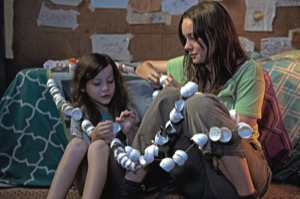
Every so often a woman escapes from the clutches of a mad kidnapper who has held her, and often other women, and often the children born in captivity, in a dank basement, a locked attic or a backyard shed. I always think it can be hard to turn these kinds of stories into serious art; no matter how handsome or well-acted a production is, the films are almost always just pulpy melodramas ripe for the satire of things like The Unbreakable Kimmy Schmidt. When Emma Donoghue won the Booker Prize for Room, her novel about a woman and her young son kept prisoner in a garden shed by the woman’s kidnapper, I had no interest in reading what I assumed was, well, a literary version of an exploitative tabloid tale. But after seeing the film adaptation, directed by Lenny Abrahamson and adapted for the screen by Donoghue, I knew I was clearly too quick to judge. Room is neither prurient nor melodramatic. It is a subtle, occasionally beautiful meditation on the extents a mother will go to protect not just her child’s body but also his mind and soul.
The mother in question, played with compelling conviction by Brie Larson, has been locked in a soundproof shed for seven years, for five years with her son Jack (Jacob Tremblay), who was the result of her captor’s rapes. The shed is just large enough for a single bed, stove, tub, toilet, wardrobe, table and old TV; there’s a skylight too high to reach. Jack, the film’s narrator has never known anything but the shed, which he and Ma call simply “room.” Ma has raised Jack to believe that there is nothing beyond room, that the things he sees on TV are magic. Ma teaches Jack how to read, they exercise, they play, Ma cooks simple dinners with the things their captor, known only as Old Nick (Sean Bridges), brings.
Every evening, Jack must go to sleep in the wardrobe before Old Nick comes to visit. Ma slyly, but still desperately prevents Nick from seeing or interacting with Jack. The film begins with Jack turning five years old and beginning to ask more questions, catch his mother in inconsistencies, and disobeying her, even interacting with Old Nick. Fearing for Jack’s safety, Ma hatches a plan to free him. Since the advertisements for the film and its trailers show this succeeding, it’s not a spoiler to say that half-way through the film Jack does escape and this leads to Ma’s rescue and return to her childhood home.
By depicting everything exclusively from Jack’s perspective, Donoghue and Abrahamson are able to focus the story and the cinematic experience on Jack’s naïve understanding of his life. This can be fascinating, moving, and even funny, but when it’s combined with Stephen Rennick’s treacly score, overly sentimental. Still, giving us only Jack’s point of view keeps the prurient horror inherent in the story off screen for the vast majority of the film, and it allows for a great deal of playing, confusion, unconditional love and simple, honest emotional reactions to his mother’s attempts to keep him safe with lies and risks. It’s very rare that child actors can achieve the naturalism of their older co-stars, and Tremblay is no Haley Joel Osment. But Abrahamson’s direction of Tremblay produced a believable performance at the same time adorable, infuriating and heartbreaking. The audience can see in Larson’s spectacular performance what Jack is missing, and this disconnect creates both sympathy for Ma and awe for her mothering.
Room
Directed by Lenny Abrahamson
Written by Emma Donoghue
Starring Brie Larson, Jacob Tremblay and Joan Allen
Rated R











